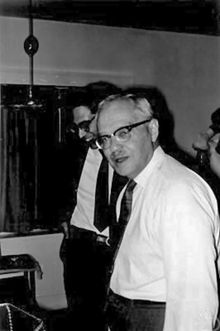Jerzy Neyman | |
|---|---|
 Neyman in 1969 | |
| Born | Jerzy Spława-Neyman April 16, 1894 |
| Died | August 5, 1981 (aged 87) Oakland, California, US |
| Nationality | Polish |
| Alma mater | University of Warsaw Kharkov University |
| Known for | Neyman construction Neyman–Pearson lemma Neyman–Rubin causal model Fisher–Neyman factorization theorem Confidence interval Hypothesis testing Statistics of galaxy clusters |
| Awards | Newcomb Cleveland Prize (1958) Guy Medal (Gold, 1966) National Medal of Science (1968) Fellow of the Royal Society[1] |
| Scientific career | |
| Fields | Mathematics |
| Institutions | Nencki Institute of Experimental Biology University College London University of California, Berkeley |
| Doctoral advisor | Wacław Sierpiński |
| Doctoral students | George Dantzig Lucien Le Cam Evelyn Fix Erich Leo Lehmann Joseph Hodges Pao-Lu Hsu |
Jerzy Neyman (April 16, 1894 – August 5, 1981; born Jerzy Spława-Neyman; Polish: [ˈjɛʐɨ ˈspwava ˈnɛjman]) was a Polish mathematician and statistician who first introduced the modern concept of a confidence interval into statistical hypothesis testing[2] and, with Egon Pearson, revised Ronald Fisher's null hypothesis testing.
Neyman spent the first part of his professional career at various institutions in Warsaw, Poland, and then at University College London; and the second part, at the University of California, Berkeley.
- ^ Kendall, D. G.; Bartlett, M. S.; Page, T. L. (1982). "Jerzy Neyman. 16 April 1894-5 August 1981". Biographical Memoirs of Fellows of the Royal Society. 28: 379–412. doi:10.1098/rsbm.1982.0015. JSTOR 769904.
- ^ Salsburg, David (2002). The Lady Tasting Tea: How Statistics Revolutionized Science in the Twentieth Century. Macmillan. p. 122. ISBN 9780805071344.